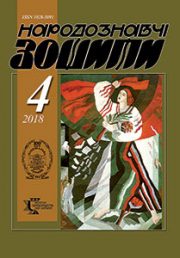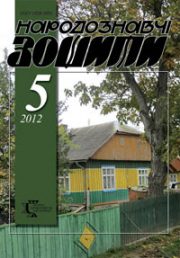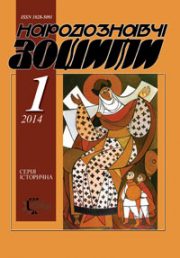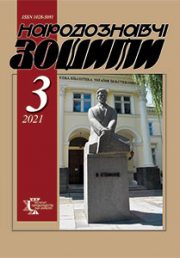The Ethnology Notebooks. 2020. № 2 (152), 474—481
UDK394.4:133.3]Зарічанська(477.87)(092)
DOI https://doi.org/10.15407/nz2020.02.474
ANCIA ZARICHANSKA IN TRADITIONAL BELIF OF DOLYNIAN TRANSCARPATHIA (BY THE FIELD MATERIALS)
KOROL Vasil
ORCID ID: https://orcid.org/0000-0002-0471-2115
Ph.D. of Sciences in History, Senior Researcher
Of the Municipal Institution «Transcarpathian museum
of folk architecture and life»
of the Transcarpathian Regional Administration,
Kapitulna 33a, 88000, Uzhgorod, Ukraine
Contacts: e-mail: anshamash@gmail.com
Abstract. The article is based on the field ethnographical materials collected by author which are considered image of sibyl-healer Anci Zarichanskoyi (Poidyn Anny) in the traditional belief of Ukrainians in Vynogradivskiy and Irshavskiy districts. Contemporary state of living in the folk faith of people gifted with esoterical features have been noticed.
The object of exploration is traditional beliefs, rituals, magic actions related with people endowed with esoterical abilities. The subject is the person with esoterical abilities in the system of demonological beliefs, its main features, functions, «relationship» with human, the impact on daily life, the ritual sphere. The demonic conceptions are characterized as important part of the folk outlook.
For creation of the sources base field expeditions were conducted. Recording of materials were performed using the oral interview of respondents for pre-prepared questionnaires.
The basis of this work is ethnographical field materials collected by author and students of historical and international relations on the faculty of DVNZ UzhNU.
In the traditional world-viewed imaginations demonical features are endowed the separate group of people which own a certain secret knowledge but they do not belong to the classical representatives of folk demonology. There are named as the people «who know», «esoterics» which differ from others by their lifestyle and social status.
The belief for what kind of people attributed certain esoteric abilities are predetermined by symbolic intersection. It can be interpreted like ritual death and new birth. On the other hand — unusual, incomprehensible to the general public and even some extent the deviant behavior provided aureole of mystery, special knowledge, esoteric and skills endowed.
The main functions are outlined possession which endowed Ancya Zarichanska. The interviewed respondent highlighted clairvoyance, healing possibility and advices for those in predicament who allowed some extent to regulate the relationships with a person on the one hand and otherworldly.
The folk belief and ceremonial actions which reveal the well-established world-view of Transcarpathian dolynians about people who provided esoteric abilities. Evidently that researched beliefs are leavings of archaic world-view with a set of different in value and origin the phenomena of ancient and modern tradition and the significant influence of church canons.
Keywords: Transcarpathia, demonology, dolyniany, belief, outlook, holiness, seer.
Received 11.02.2020
REFERENCES
Varkhol, N. (2011). Mykhailo Siryi — the last «prophet of the Psalter» in the Priashivshchyna. Folk art and ethnology, 6, 42—44. Kiev [in Ukrainian].
Zan, M. (1998). About Antsiu — a healer from Zarichchia. Nash ridnyi krai, 4, 28 [in Ukrainian].
Kobal, A.I., & Fehyr, V.V. (2004). Zarichchia: Historical essay. Uzhhorod: Publishing «Zakarpattia» [in Ukrainian].
Pankevych, I. (1938). Ukrainian speeches Pidkarpatskoi Rusi and related areas (Part 1). Sound and morphology. Praha [in Ukrainian].
Todorova-Pirgova, I. (1999). Ideas about «otherwordly» in biographical narratives. Zhivaya Starina, 2, 25—27. Moscow [in Russian].
Tolstaya, S.M. (2012). Death. Slavic antiquities: ethnological dictionary (Vol. 5, pp. 58—71). Moscow: International relationships [in Russian].







